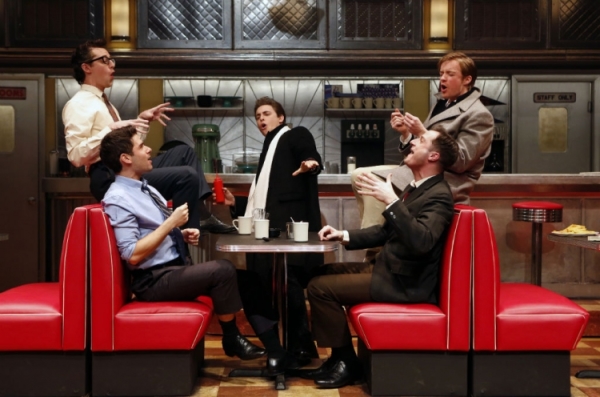Diner

(© Carol Rosegg)
If you recognize the names Boogie, Modell, Eddie, Shrevie, Fenwick, and Billy, chances are you saw Barry Levinson's 1982 Oscar-nominated film, Diner. Now those six buddies are back, in Signature Theatre's world premiere of Diner, a highly polished adaptation of the movie, with book by Academy Award winner Levinson and music and lyrics by nine-time Grammy Award winner Sheryl Crow.
The challenge for any remake is to expand the original and enlarge its vision. Diner does that. It is still less a serious investigation of character than it is a celebratory period piece that will entertain all who treasure the memory of Cherry Cokes, Frankie Avalon, Brylcreem, and The Silhouettes. Yet amid this raucous coming-of-age story are new, quiet observations on love, self-esteem, and marriage.
Set in Baltimore, Maryland, from Christmas to New Year's Eve of 1959, Diner presents six young men who were friends when they were young. Now in their early 20s, they gather to celebrate the marriage of Eddie (Adam Kantor) to his girlfriend, Elyse (Tess Soltau). Before the wedding, the men talk about careers, money, and women. The smooth-talking main character, Boogie (Derek Klena), has a gambling problem and is seriously in debt. Fenwick (Matthew James Thomas) drinks too much and lives off his trust fund. Romantic business school student Billy (Aaron C. Finley) loves Barbara (Whitney Bashor), who is dedicated to her career. Shrevie (Josh Grisetti) is married but can't even understand his own wife, Beth (Erika Henningsen).
Levinson's plot spins quickly from scene to scene, weaving in many references to real life in Baltimore. In addition, Levinson has added an older version of Boogie (John Schiappa), as a narrator who predicts the characters' futures at the end of the play. His presence serves to distance the play's action slightly, as if trying to make sense of a dream. Levinson's best idea was to feature women in Diner. Discussing everything from whether they will get married to how they will run their homes, Soltau, Henningsen, and Bashor have strong, clear voices, both while alone and in an ensemble. The incomparable Nova Y. Payton plays several critical parts in Diner, all of them with power and grace.
Each of Levinson's scenes is built around a song — some slow and touching, some with a swinging rock 'n' roll sound. Crow's expertise as a singer and songwriter is immediately recognizable in her clever melodies and imaginative lyrics. The numbers don't sound like contemporary Crow songs. Instead, they throw back to 1959 and feel as though they were composed by an artist who really understood the doo-wop imperative.
Crow's handiwork is carried out superbly by the Diner cast members, all of whom are excellent actors, singers, and dancers. Finley's sweet tenor is beautifully appropriate for Billy's yearning number, "Please Be There." Kantor and Grisetti are delightful together in the semi-cynical view of marriage, "It's Good." Ben Lurye, Mitch Marois, David Rowen, and Lou Steele provide sensational backup as The Doo-Wop Guys. Three-time Tony Award-winning director and choreographer Kathleen Marshall creates nearly continuous movement, fitting in bits of the Lindy, cha-cha, and the stroll without making the musical look like an episode of American Bandstand.
Derek McLane's scenic design shows the exterior of a silver diner, for which lighting designer Peter Kaczorowski creates a huge "Diner" sign in bright red neon. The interior is seen through big dirty windows until the action moves inside, at which point the front of the diner slides offstage to reveal the counter and red vinyl booths. Paul Tazewell uses a variety of costumes, from Shrevie's red bowling shirt to Fenwick's and Billy's V-necked sweaters and button-down shirts. The women get pencil skirts, circle pins, and broadly flared dance dresses.
In Levinson's movie the central appeal was a sense that, no matter what, these six young men would always be able to come home to the diner. The musical, however, brings a more realistic question mark to this idealistic notion, suggesting that change and impermanence are guiding factors in impending adulthood. But thankfully, Levinson and Crow's Diner is something you never outgrow.











